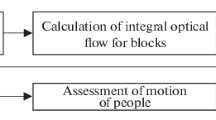Abstract
A fast and robust algorithm for the detection of independently moving objects by a moving observer by means of investigating optical flow fields is presented. The detection method for independent motion relies on knowledge about the camera motion. Even though inertial sensors provide information about the camera motion, the sensor data does not always satisfy the requirements of the proposed detection method. The first part of this paper therefore deals with the enhancement of earlier work [29] by ego-motion refinement. A linearization of the ego-motion estimation problem is presented. Further on a robust enhancement to this approach is given.
Since the measurement of optical flow is a computationally expensive operation, it is necessary to restrict the number of flow measurements. The proposed algorithm uses two different ways to determine the positions, where optical flow is calculated. A fraction of the positions is determined by using a sequential Monte Carlo sampling resampling algorithm, while the remaining fraction of the positions is determined by using a random variable, which is distributed according to an initialization distribution. This approach results in a fixed number of optical flow calculations leading to a robust real time detection of independently moving objects on standard consumer PCs.
This work was supported by BMBF Grant No. 1959156C.
Preview
Unable to display preview. Download preview PDF.
Similar content being viewed by others
References
Badino, H.: A Robust Approach for Ego-Motion Estimation Using a Mobile Stereo Platform. Proc. IWCM (2004)
Barron, J.L., Fleet, D.J., Beauchemin, S.S., Burkitt, T.A.: Performance Of Optical Flow Techniques. Proc. CVPR 92, 236–242 (1994)
Black, M.J., Fleet, D.J.: Probabilistic Detection and Tracking of Motion Discontinuities. In: ICCV (1999)
Bruss, A.R., Horn, B.K.P.: Passive Navigation. CGIP 21, 3–20 (1983)
Doucet, A., de Freitas, N., Gordon, N.: Sequential Monte Carlo Methods in Practice. Springer, Heidelberg (2001)
Fischler, M., Bolles, R.: RANdom SAmpling Consensus: a paradigm for model fitting with application to image analysis and automated cartography. Commun. Assoc. Comp. Mach. 24 (1981)
Hartley, R.: Computation of the essential matrix from 6 points. http://rsise.anu.edu.au/~hartley/Papers/6pt/6ptnew.pdf
Hartley, R.: In defence of the eight-point algorithm. IEEE TPAMI 19(6), 580–593 (1997)
Hartley, R., Zisserman, A.: Multiple View Geometry. Cambridge University Press, Cambridge (2000)
v.d. Hengel, A., Chojnacki, W., Brooks, M.J.: Determining the Translational Speed of a Camera from Extended Optical Flow. In: Jähne, B., Mester, R., Barth, E., Scharr, H. (eds.) IWCM 2004. LNCS, vol. 3417, pp. 190–197. Springer, Heidelberg (2007)
Hue, C., Le Cardre, J.-P., Perez, P.: Tracking Multiple Objects with Particle Filtering. IEEE Transactions on Aerospace and Electronic Systems 38(3), 791–812 (2002)
Isard, M., Blake, A.: Condensation – conditional density propagation for visual tracking. IJCV 29(1), 5–28 (1998)
Isard, M., Blake, A.: ICONDENSATION: Unifying low-level and high-level tracking in a stochastic framework. ECCV 1, 893–908 (1998)
Isard, M., McCormick, J.: BraMBLe: A Bayesian Multiple-Blob Tracker. ICCV (2001)
Kanatani, K.: Optimal fundamental matrix computation: Algorithm and reliability analysis. SSII (2000)
Kanatani, K., et al.: Fundamental matrix from optical flow: Optimal computation and reliability evaluation. JEI (2000)
Khan, Z., Balch, T., Dellaert, F.: An MCMC-Based Particle Filter for Tracking Multiple Interacting Targets. ECCV (2004)
Longuet-Higgins, H.C.: A computer algorithm for reconstructing a scene from two projections. Nature 293, 10 (1981)
Lucas, B., Kanade, T.: An iterative image registration technique with an application to stereo vision. In: Proc. DARPA IU Workshop, pp. 121–130 (1981)
Perez, P., et al.: Color-Based Probabilistic Tracking. ECCV (2002)
Pollefeys, M., Koch, R., Van Gool, L.J.: Self-Calibration and Metric Reconstruction in Spite of Varying and Unknown Internal Camera Parameters. IJCV 32(1), 7–25 (1999)
Rousseeuw, P.J., Leroy, A.M.: Robust Regression and Outlier Detection. John Wiley and Sons, Chichester (1987)
Suzuki, T., Kanade, T.: Measurement of vehicle motion and orientation using optical flow. IEEE ITS, Tokyo (1999)
Tian, T.Y., Tomasi, C., Heeger, D.J.: Comparison of robust approaches to ego-motion computation. CVPR (1996)
Torr, P.H.S., Zisserman, A.: MLESAC: A new robust estimator with application to estimating image geometry. CVIU (1996)
Torr, P.H.S., Murray, D.W.: Development and Comparison of Robust Methods for Estimating the Fundamental Matrix. IJCV (1996)
Tsai, R.Y., Huang, T.S.: The perspective view of three points. IEEE TPAMI 6, 13–27 (1984)
Woelk, F., Gehrig, S., Koch, R.: A Monocular Image Based Intersection Assistant. In: IEEE Intelligent Vehicles, Parma, Italy (2004)
Woelk, F., Koch, R.: Fast Monocular Bayesian Detection of Independently Moving Objects by a Moving Observer. In: DAGM, Tübingen, Germany, pp. 27–35 (2004)
Vermaak, J., et al.: Maintaining Multi-Modality through Mixture Tracking. ICCV (2003)
Zelek, J.S.: Bayesian Real-time Optical Flow. Proc VI (2002)
Zhang, Z.: Determining the epipolar geometry and its uncertainty - a review. IJCV 27(2), 161–195 (1998)
Zhang, Z.: Parameter Estimation Techniques: A Tutorial with Application to Conic Fitting (1996), http://www-sop.inria.fr/robotvis/personnel/zzhang/Publis/Tutorial-Estim/Main.html
Author information
Authors and Affiliations
Editor information
Rights and permissions
Copyright information
© 2007 Springer Berlin Heidelberg
About this paper
Cite this paper
Woelk, F., Koch, R. (2007). Robust Monocular Detection of Independent Motion by a Moving Observer. In: Jähne, B., Mester, R., Barth, E., Scharr, H. (eds) Complex Motion. IWCM 2004. Lecture Notes in Computer Science, vol 3417. Springer, Berlin, Heidelberg. https://doi.org/10.1007/978-3-540-69866-1_16
Download citation
DOI: https://doi.org/10.1007/978-3-540-69866-1_16
Publisher Name: Springer, Berlin, Heidelberg
Print ISBN: 978-3-540-69864-7
Online ISBN: 978-3-540-69866-1
eBook Packages: Computer ScienceComputer Science (R0)




